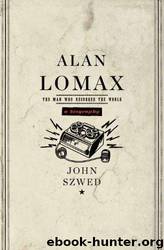Alan Lomax by John Szwed

Author:John Szwed
Language: eng
Format: mobi, epub
Tags: Instruction & Study, Music, Social Science, Folklore & Mythology, Theory
ISBN: 9780434012329
Publisher: Random House
Published: 2010-10-01T19:59:31.055826+00:00
When Pete Seeger returned from the war he was on fire with ideas about changing the world through song. With the help of Alan, John Hammond, Oscar Brand, the remaining Almanacs, and representatives of the CIO, he created People’s Songs, Inc., a corporation designed to develop “tens of thousands” of union choruses for strikes, publicity, and as a means for increasing attendance at meetings. (“Just as every church has a choir, why not every union?”) “People” captured a certain feel of America at that particular moment. Echoing Marx, Emerson, and Whitman, it also reached back to the German Romantics, Alexander von Humboldt, and finally to the Constitution. The group as Pete conceived it, however, was far from romantic, but organized like a proper corporation, with an elected board and registered with the state of New York. Pete did most of the work of fund-raising, organizing meetings, making connections to unions and political groups, and running a small office in Times Square, and once Pete was in motion he was hard to resist. His energy and enthusiasm drew people in, and within a year there were write-ups in major papers and magazines, several thousand members signed up, fifteen thousand songs on file, and a four-person staff in the office. A monthly bulletin, People’s Songs, edited by Pete, contained traditional songs (often with new words), labor and topical songs, and news of members, some of whom wrote from jail, where they had wound up after supporting one strike or another. Pete and Earl Robinson set off around the country, singing on picket lines, recruiting members, and opening up branch organizations of People’s Songs. They also launched a series of “Hootenannies” to raise money and attract new members. Time magazine sent a reporter to a hoot at Irving Place in New York, where he said there were two hundred onstage and a thousand in the audience, some of whom had brought along their guitars.
Alan went up to Columbia University’s Teachers College to ask for help from the progressive educators there on getting people to sing, and found Professor Lilla Belle Pitts, famous for her belief in music as a force for change. Her goal was to create a musical culture of collective singing that would bring American communities together in greater tolerance and openness. Alan was quoted by Time as saying, “We’re going to put more into our songs than June moon croon spoon, and sing Senator Bilbo [the fiery segregationist senator from Mississippi] out of Congress.” With the success of this first New York City hoot, they scheduled two more for the following month in the larger Town Hall—a “Union Hoot” and a “Freedom Hoot.” Even with minimal publicity, the turnout for the Union concert was substantial, and the subsequent one was sold out.
Their plans escalated into a proposed national cultural congress, a publishing company, radio programs, recordings. But the times were not with them. Some of the unions saw music as a necessary evil, especially when it was a style alien
Download
This site does not store any files on its server. We only index and link to content provided by other sites. Please contact the content providers to delete copyright contents if any and email us, we'll remove relevant links or contents immediately.
| Classical | Country & Folk |
| Heavy Metal | Jazz |
| Pop | Punk |
| Rap & Hip-Hop | Rhythm & Blues |
| Rock |
Cecilia; Or, Memoirs of an Heiress — Volume 2 by Fanny Burney(31956)
Cecilia; Or, Memoirs of an Heiress — Volume 3 by Fanny Burney(31942)
Fanny Burney by Claire Harman(26603)
We're Going to Need More Wine by Gabrielle Union(19046)
Plagued by Fire by Paul Hendrickson(17413)
All the Missing Girls by Megan Miranda(16030)
Cat's cradle by Kurt Vonnegut(15359)
For the Love of Europe by Rick Steves(14121)
Bombshells: Glamour Girls of a Lifetime by Sullivan Steve(14077)
Leonardo da Vinci by Walter Isaacson(13337)
4 3 2 1: A Novel by Paul Auster(12393)
The remains of the day by Kazuo Ishiguro(9000)
Adultolescence by Gabbie Hanna(8927)
Note to Self by Connor Franta(7671)
Diary of a Player by Brad Paisley(7581)
Giovanni's Room by James Baldwin(7346)
What Does This Button Do? by Bruce Dickinson(6207)
Ego Is the Enemy by Ryan Holiday(5450)
Born a Crime by Trevor Noah(5383)
